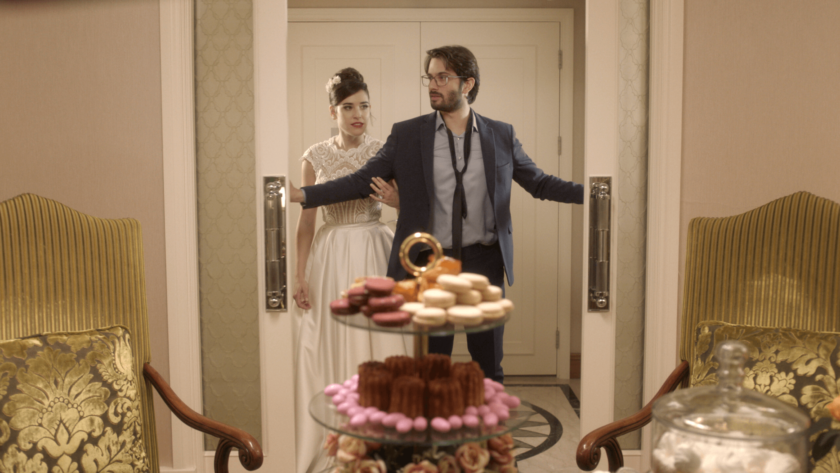BFI’s London Film Festival is in town! The FilmSoc Blog is back for the 64th edition of one of Europe’s largest film festivals, delivering a first look at the hits and misses of the 2020-21 season.
Dan Jacobson reviews Talya Lavie’s sophomore feature, screening in the ‘Laugh’ strand of London Film Festival.
Affectionately, Israeli-born Jews – including much of my own extended family – are known as sabras. A sabra is a type of prickly pear, which is found in the Negev desert in the south of the country. The term carries a certain stereotype – one which pairs the rambunctiousness and impatience found in the blaring horns of a Tel Aviv traffic jam, with the openness and sensitivity associated with famous Israeli hospitality. Consequently, the sabra has become a poignant portrait of Israeli Jews – tough and thorny on the outside, but sweet, delicate, and soft on the inside. As such, it makes sense to me that Israelis might have something to teach us about marriage – the embodiment of commitment, honesty, trust, understanding, and compromise.
Honeymood, which made its worldwide premiere virtually as part of the BFI London Film Festival 2020, is the second film by Israeli filmmaker Talya Lavie. Her debut film Zero Motivation, which was released in 2014 and won Best Narrative Feature at the Tribeca Film Festival, was a brilliant portrait of young Israelis whiling away their best years during military service. It was also a pitch-perfect blend of comedy and intense dark moments, which complemented and enhanced each other. Honeymood, replacing an isolated desert military base with Jerusalem city centre, continues to play heavily on these themes.
Honeymood focuses on two newlyweds, Eleanor and Noam, who, upon arriving at their honeymoon suite, find that Noam has been gifted a ring by his ex-girlfriend. Driven by Eleanor’s intense jealousy and suspicions, the couple set off around the city in order to return it. In visiting exes and parents, and in conversation with an array of characters encountered throughout the night, the couple are forced to confront the basis of their whirlwind romance, their own urges, and how their union will change their lives.
If Honeymood confirms anything suggested by Zero Motivation, it’s that Talya Lavie is as good of a comedy director as it comes. The film is visually arresting, set against the backdrop of Jerusalem’s gorgeous orange-tinted glow. The best moments come in the subtle details – a heated argument spliced among softer moments, the audio cues to signify a character’s presence, or revealing the most absurd, dark, and hilarious moments right at a scene’s emotional peak.
That said, the comedy mainly arises from the film’s script and delivery which perfectly epitomises the sabra-style dialect: fast-paced, passionate, with no room for pauses or interruptions — not dissimilar to the dinner table of any Israeli family, It resembles an Aaron Sorkin script, were he to trade exclusively in ‘feelings’ and ‘opinions’. This extends hilariously to Noam’s mother, who embodies the most stereotypical features of Jewish family life – a mother shoving food in her son’s face, unable to stop herself arguing over the phone when she is trying to be silent, and casually describing herself as an “emotional wreck” as she snacks on pretzels.
The film differentiates itself from standard romantic comedies by virtue of its gleefully dark moments. The newlyweds encounter them over the course of the evening, and they allow for proper reflection on their personal concerns which must be rectified if their relationship is to succeed: Eleanor and growing up, Noam and his passive complacency, and both on their reluctance to move on from the past.
The film ends abruptly, only a few minutes after the film’s individual stories come to a dramatic head in possibly the most brilliant piece of tragicomedy I have seen in a very long time. You are also left wondering if, given how they have responded to each other over the course of this ridiculous night, Eleanor and Noam would make a ‘successful’ couple, and whether success defined by longevity, as his father suggests, or by some arbitrary measure of ‘happiness’ or ‘fulfilment’.
Other films might ask these questions more subtly. In Force Majeure, for example, the conflicts are expressed in the gaps, the staggered conversations where the characters refuse to state their problem explicitly. But that isn’t the way of the sabra and, at least on a comedic level, that is for the audience’s benefit. At its centre, though, Honeymood retains the same inconvenient truths: it is impossible to enter a marriage with a complete knowledge and understanding of someone, although many would like to think that isn’t true. So, when you find out something unsavoury which has been kept hidden from you, how do you respond?
The British are the opposite of Israeli sabras: they maintain a ‘stiff upper lip’, they don’t upset apple carts by talking about personal problems, and they shed tears solely over Princess Diana or the 1966 World Cup. Whilst I may have found the sabra mentality somewhat unnerving at first, I now find it both familiar and comforting, knowing that these ‘robust discussions’, unnecessarily argumentative on the surface, are ultimately and fundamentally demonstrations of love and trust. Honeymood is a gorgeous ode to that, and I hope that the London Film Festival attendees will recognise something within it.




